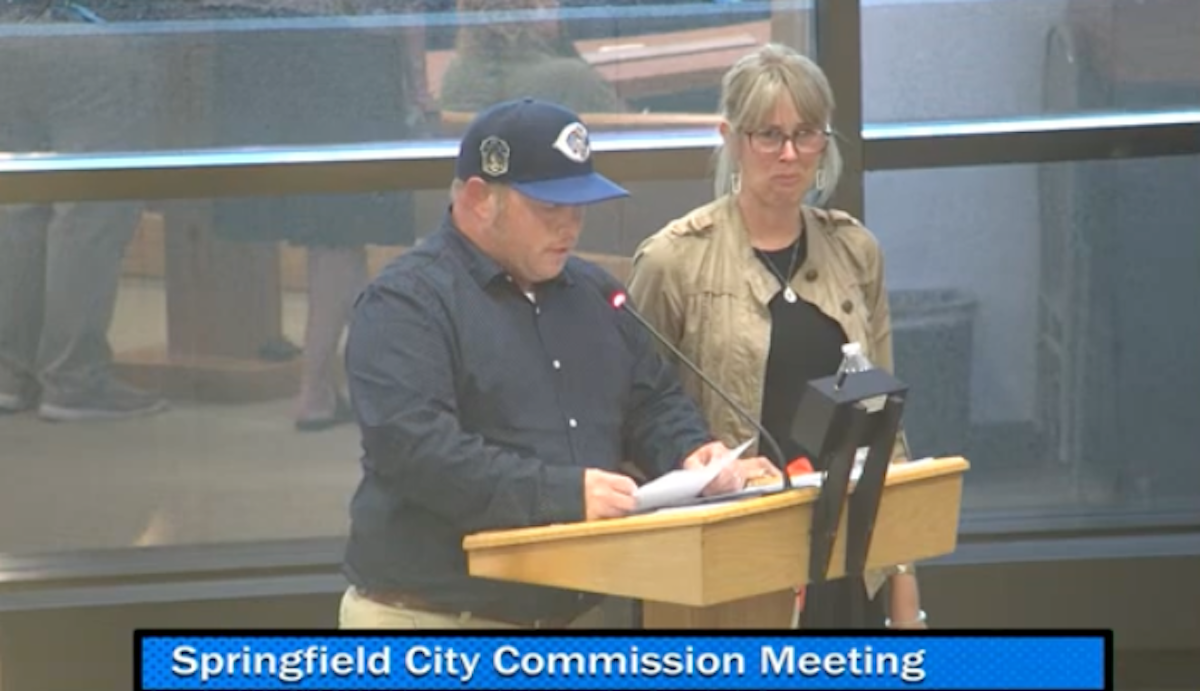
A sign stands outside of the Heritage Center of Clark County in Springfield, Ohio, Wednesday, Sept. 11, 2024.
A bomb threat was sent to several city agencies in Springfield, Ohio, on Thursday morning, prompting multiple facilities to be evacuated, including Springfield City Hall, Fulton Elementary School and area locations of the Ohio Bureau of Motor Vehicles.
The emailed threat was also sent to media outlets, according to the city commission office, and prompted a large police response as local and regional law enforcement agencies investigate.
"Our primary concern is the safety and well-being of our employees and residents," the office said. "We are working to address this situation as swiftly as possible. We ask the community to avoid the area surrounding City Hall vicinity while the investigation is ongoing and to report any suspicious activity to the Springfield Police Division."
The City of Springfield posted to social media that City Hall would be closed for the remainder of the day.
The predominantly white, blue-collar city of about 60,000 was thrust into the national spotlight this week during the presidential debate when Republican nominee and former President Donald Trump amplified the false claims that Haitian immigrants in Springfield are eating their neighbors’ pets.
While its not yet known if the bomb threats and the rhetoric at the debate are connected, and authorities have made no such links as of Thursday afternoon, it comes as right-wing politicians, including Trump's running mate, JD Vance, have widely shared false claims about Haitian immigrants.
Bryan Heck, the city manager in Springfield, has said there is no credible or detailed reports of any pets being abducted or eaten. In a video statement posted to Facebook Wednesday, Heck said it was “disappointing” that the narrative about the city had been “skewed by misinformation circulating on social media and further amplified by political rhetoric in the current, highly charged presidential election cycle.”
Debate moderators refute Trumps claim of immigrants eating family pets
In the past few years, roughly 15,000 immigrants have arrived in Springfield, drawn by good jobs and the city’s relative affordability.
Get a weekly recap of the latest San Francisco Bay Area housing news. >Sign up for NBC Bay Area’s Housing Deconstructed newsletter.
But a rising sense of unease has crept in as longtime residents increasingly bristle at newcomers taking jobs at factories, driving up housing costs, worsening traffic and straining city services.
At the city’s Haitian Community Help and Support Center on Wednesday, Rose-Thamar Joseph said many of the of immigrants are now saying they are scared for their life.
Melanie Flax Wilt, a Republican commissioner in the county where Springfield is located, said she has been pushing for community and political leaders to “stop feeding the fear.”
“After the election and everybody’s done using Springfield, Ohio, as a talking point for immigration reform, we are going to be the ones here still living through the challenges and coming up with the solutions,” she said.
Ariel Dominique, executive director of the Haitian American Foundation for Democracy, said she laughed at first at the absurdity of the false claims. But seeing the comments repeated on national television by the former president was painful.
“It is so unfair and unjust and completely contrary to what we have contributed to the world, what we have contributed to this nation for so long,” Dominique said.
The falsehoods about Springfield's Haitian immigrants were spread online by Vance on the eve of Tuesday's debate between Trump and Vice President Kamala Harris. It's part of a timeworn American political tradition of casting immigrants as outsiders.
“This is what’s happening in our country. And it’s a shame,” Trump said at the debate after repeating the falsehoods. When challenged by ABC News moderator David Muir over the false claims, Trump held firm, saying “people on television” said their dogs were eaten, but he offered no evidence.
Many Haitians have come to the U.S. to flee poverty and violence. They have embraced President Joe Biden's new and expanded legal pathways to enter, and have shunned illegal crossings, accounting for only 92 border arrests out of more than 56,000 in July, the latest data available.
The Biden administration recently announced an estimated 300,000 Haitians in the U.S. could remain in the country at least through February 2026, with eligibility for work authorization, under a law called Temporary Protected Status. The goal is to spare people from being deported to countries in turmoil.
Springfield, about 45 miles from the state capital of Columbus, suffered a steep decline in its manufacturing sector toward the end of the last century, and its population shrank as a result. But its downtown has been revitalized in recent years as more Haitians arrived and helped meet the rising demand for labor as the economy emerged from the pandemic. Officials say Haitians now account for about 15% of the population.
The city was shaken last year when a minivan slammed into a school bus, killing an 11-year-old boy. The driver was a Haitian man who recently settled in the area and was driving without a valid license. During a city commission meeting on Tuesday, the boy's parents condemned politicians' use of their son's death to stoke hatred.
Last week, a post on the social media platform X shared what looked like a screengrab of a social media post apparently out of Springfield. The post claimed without evidence that the person’s “neighbor’s daughter’s friend” saw a cat hanging from a tree to be butchered and eaten, outside a house where it claimed Haitians lived. It was accompanied by a photo of a Black man carrying what appeared to be a goose by its feet.
On Monday, Vance posted on X: “Reports now show that people have had their pets abducted and eaten by people who shouldn’t be in this country.” The next day, he posted again, saying his office had received inquiries from Springfield residents who said “their neighbors’ pets or local wildlife were abducted by Haitian migrants.”
Long-time Springfield resident Chris Hazel, who knows the park and neighborhood where the pet and goose abductions were purported to have happened, called the claims “preposterous.”
“It reminds me of when people used to accuse others and outsiders as cannibals. It’s dehumanizing a community," he said of the accusations against the city's Haitian residents.
Sophia Pierrilus, the daughter of a former Haitian diplomat who moved to the Ohio capital of Columbus 15 years ago and is now an immigrant advocate, agreed, calling it all political.
“My view is that’s their way to use Haitians as a scapegoat to bring some kind of chaos in America,” she said.
With its rising population of immigrants, Springfield is hardly an outlier. So far this decade, immigration has accounted for almost three-quarters of U.S. population growth, with 2.5 million immigrants arriving in the United States between 2020 and 2023, according to the U.S. Census Bureau. Population growth is an important driver of economic growth.
“The Haitian immigrants who started moving to Springfield the last few years are the reason why the economy and the labor force has been revitalized there,” said Guerline Jozef, executive director of the Haitian Bridge Alliance, which provides legal and social services to immigrants across the U.S.
Now, she said, Haitians in Springfield have told her that, out of fear, they are considering leaving the city.




